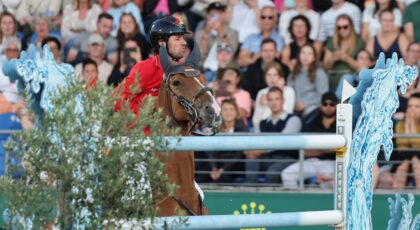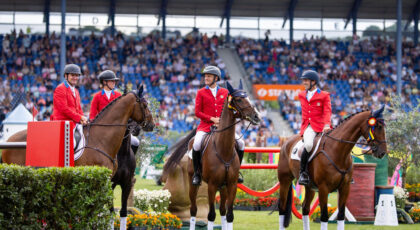In honor of International Women’s Day, I decided to open up a topic that I’ve always been very passionate about: how do gender roles impact women (and men) in the equestrian world?
Traditional careers in a corporate setting are regulated and hotly debated regarding this; equal pay incentives and non-discrimination clauses. But what about the horse industry? It’s no secret that when it comes to employment law in our sector, we are often left hung out to dry. It’s also a well-known fact that we are the only Olympic disciplines where men and women compete on a level playing field.
With that being said, are women (or men) at a disadvantage because of this, and how does this impact the success of either gender within our sport?
Why so unequal?
I’m sure all of us could think of an instance (or many) where our gender came at a disadvantage to us in our sport. (This is a sensitive topic, and as a woman, I am going to try to remain as unbiased as possible, but admit I am most likely skewed towards inequality in favor of women.)
When you start to look at the striation of top athletes competing and winning at an international level, there is a disproportionate number of women at the grassroots level and men winning on podiums. There are obviously many opinions and articles of research done on this, but my goal for this is to merely shed light on an on-going imbalance and let the readers discuss as they will.
In a majority of industries and professions, men dominate the field. I don’t mean this in terms of numbers, I’m talking about promotions, scalable pay and the number of men at the “top.” In the equestrian world roughly 75% of competitors in most countries are women! So why do we see so few of them on the podium?

(From Left to right) Rio Silver Medalist Nicolas Astier FRA, Michael Jung GER Gold, and Philip Dutton USA Bronze.
©Arnd Bronkhorst
I believe there are many factors involved with this, and sure, you can argue that in recent years more and more women are being recognized at the top level. But how many of these women are able to do this on sheer merit alone, and how many are being backed by influential men or are wives of men with influence and power? I’m not stating that this is necessarily a bad thing, but it’s something to take note of and it also opens another topic I’ll be discussing later about money and influence in our sport.
Before the ladies chew me out, hear me out: I KNOW women are amazing riders, and are just as good as men. There are some seriously talented women out there who have earned this in their own right, with no help from anyone. In equal competition I fully support and believe women have as good of a chance at winning as men. Equestrian sport is not a sport of sheer brawn, but one of intelligence, precision and harmony—these qualities give women a chance to succeed.
The men that choose our fates
That argument, however, requires equal competition. And this is where I believe the inequality occurs. Someone has to choose a team of riders to represent their country in international sport. The majority of selection committees, stewards, course designers and even top federation officials are male. There could be the argument that men are favoured over women for their strength and rational thinking, or perhaps still revert to the “old boy’s club” that equestrian sport used to be.
Maybe sponsors also prefer to support men. It’s hard to say which came first, or rather if there are structural effects that feed off each other.
Seeing women in high positions of power makes people uncomfortable at times and people are much less likely to trust a woman to be “in charge.” Take one look at the American Presidential elections in terms of gender equality and I think we can agree. There may be subtle underpinnings of this in our sport as well, despite our best efforts to include more women at the top level. Do we trust women to handle the pressure to go out and get that gold medal, or are they too emotional and unpredictable?

© FEI/Germain Arias-Schreiber
Another important factor to consider, which could very well lead to Olympic selection committees or sponsors to favour men over women, is child-bearing. Unlike a corporate job where you can take maternity leave, the equestrian sport doesn’t allow for time off. Everyone knows you’re only as good as your last win, so why would you have a child and risk losing your spot on the world stage?
Women have to make a choice and I think that this is the very decision that makes our sport completely unequal in terms of gender. A woman literally has to choose between keeping her career at a top level or having children.
You may argue that within a year or two she can regain her spot and I’ve seen it happen. But what happens to her sponsorships in the meantime? How many years will it take her to regain her place at the top? And can we be positive that committees and the people that will decide her fate won’t think she’s a gamble?
I can tell you what happens in reality. Most top level female equestrian athletes just don’t have children. I can’t and won’t quote you statistics, but of the three female Olympic riders I rode for, the entire child count = a big fat 0. I’m not saying that they regret their decision, but it seems like there is a serious choice to be made here and one that affects them significantly, because their male counterparts can continue competing, even if they decide to start a family.
I realize that this is an issue for a lot of competitive women in ALL sports, but equestrianism is a sport that spans DECADES, while most other athletic disciplines allow you to retire well before child-bearing age. This is just one major topic to the issue of gender inequality in our sport, but I believe it is a significant one.

©Stefano Grasso
There are so many facets to this topic, so I won’t keep going on about it.
We could discuss the actual business of horses, say for example buying and selling. There are structural inequalities in doing business dealings with men, who may be naturally inclined to “push” women around and take advantage during deals.
Other trainers may try to intimidate women or exclude them, or even call them a “b!&$@” for being tough. That’s a whole different topic as well: how women have adapted in our industry and can sometimes be callous, rough and cold, in response to needing a thick skin to deal with men on “equal” terms.
Regardless of your gender, I’m sure you can agree that while we do get to compete on an equal level, our equestrian sport is far, far from truly “equal.”
I’m sure there are also many examples of times when men have experienced discrimination in the sport or unfair dealings, say in dressage, which is classically a female-dominated discipline. I don’t mean to exclude men in this discussion and would love to hear from my male readers regarding this topic as well. I hope we can all have an open mind regarding this, as at the end of the day, having a fair, healthy sport is a mutual goal for all of us.
Sources:
McHugh. A. (2013). Men, Women and Horses.
FEI Organization
About the Author
Sarah Eder is an avid blogger, horse professional and closet fashionista trying to live a balanced life with her crazy Grand Prix horse and boyfriend in tow.


 March 21, 2017
March 21, 2017 
























